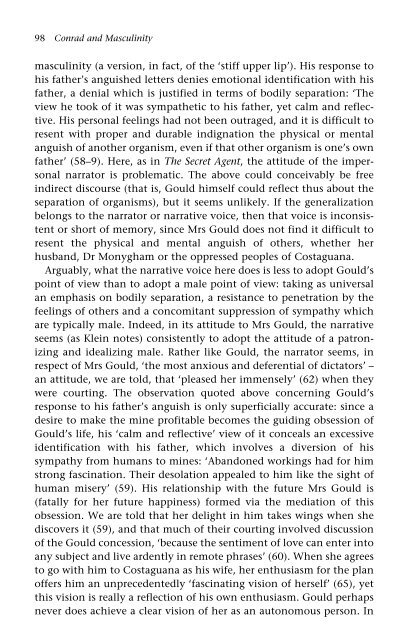Conrad and Masculinity
Conrad and Masculinity
Conrad and Masculinity
You also want an ePaper? Increase the reach of your titles
YUMPU automatically turns print PDFs into web optimized ePapers that Google loves.
98 <strong>Conrad</strong> <strong>and</strong> <strong>Masculinity</strong><br />
masculinity (a version, in fact, of the ‘stiff upper lip’). His response to<br />
his father’s anguished letters denies emotional identification with his<br />
father, a denial which is justified in terms of bodily separation: ‘The<br />
view he took of it was sympathetic to his father, yet calm <strong>and</strong> reflective.<br />
His personal feelings had not been outraged, <strong>and</strong> it is difficult to<br />
resent with proper <strong>and</strong> durable indignation the physical or mental<br />
anguish of another organism, even if that other organism is one’s own<br />
father’ (58–9). Here, as in The Secret Agent, the attitude of the impersonal<br />
narrator is problematic. The above could conceivably be free<br />
indirect discourse (that is, Gould himself could reflect thus about the<br />
separation of organisms), but it seems unlikely. If the generalization<br />
belongs to the narrator or narrative voice, then that voice is inconsistent<br />
or short of memory, since Mrs Gould does not find it difficult to<br />
resent the physical <strong>and</strong> mental anguish of others, whether her<br />
husb<strong>and</strong>, Dr Monygham or the oppressed peoples of Costaguana.<br />
Arguably, what the narrative voice here does is less to adopt Gould’s<br />
point of view than to adopt a male point of view: taking as universal<br />
an emphasis on bodily separation, a resistance to penetration by the<br />
feelings of others <strong>and</strong> a concomitant suppression of sympathy which<br />
are typically male. Indeed, in its attitude to Mrs Gould, the narrative<br />
seems (as Klein notes) consistently to adopt the attitude of a patronizing<br />
<strong>and</strong> idealizing male. Rather like Gould, the narrator seems, in<br />
respect of Mrs Gould, ‘the most anxious <strong>and</strong> deferential of dictators’ –<br />
an attitude, we are told, that ‘pleased her immensely’ (62) when they<br />
were courting. The observation quoted above concerning Gould’s<br />
response to his father’s anguish is only superficially accurate: since a<br />
desire to make the mine profitable becomes the guiding obsession of<br />
Gould’s life, his ‘calm <strong>and</strong> reflective’ view of it conceals an excessive<br />
identification with his father, which involves a diversion of his<br />
sympathy from humans to mines: ‘Ab<strong>and</strong>oned workings had for him<br />
strong fascination. Their desolation appealed to him like the sight of<br />
human misery’ (59). His relationship with the future Mrs Gould is<br />
(fatally for her future happiness) formed via the mediation of this<br />
obsession. We are told that her delight in him takes wings when she<br />
discovers it (59), <strong>and</strong> that much of their courting involved discussion<br />
of the Gould concession, ‘because the sentiment of love can enter into<br />
any subject <strong>and</strong> live ardently in remote phrases’ (60). When she agrees<br />
to go with him to Costaguana as his wife, her enthusiasm for the plan<br />
offers him an unprecedentedly ‘fascinating vision of herself’ (65), yet<br />
this vision is really a reflection of his own enthusiasm. Gould perhaps<br />
never does achieve a clear vision of her as an autonomous person. In




